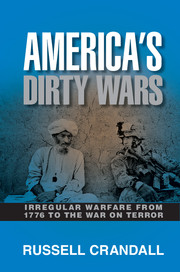Book contents
- Frontmatter
- Dedication
- Contents
- List of Figures
- Acknowledgments
- 1 Introduction
- 2 Irregular Warfare 101
- Part One The American Revolution to Chasing Sandino, 1776–1930s
- Part Two The Cold War, 1940s–1989
- Part Three Latin America and the Cold War, 1950s–1980s
- 20 From Guatemala, 1954, to Cuba and the Bayof Pigs, 1961
- 21 Guatemala, Post-1963
- 22 Cuba, Post-1963
- 23 Intermezzo
- 24 Carter, Reagan, and the Sandinista Revolution in Nicaragua, 1979–1990
- 25 El Salvador, 1979–1992
- Part Four Post–Cold War, 1990s–2000s
- Notes
- Bibliography
- Index
22 - Cuba, Post-1963
Published online by Cambridge University Press: 05 July 2014
- Frontmatter
- Dedication
- Contents
- List of Figures
- Acknowledgments
- 1 Introduction
- 2 Irregular Warfare 101
- Part One The American Revolution to Chasing Sandino, 1776–1930s
- Part Two The Cold War, 1940s–1989
- Part Three Latin America and the Cold War, 1950s–1980s
- 20 From Guatemala, 1954, to Cuba and the Bayof Pigs, 1961
- 21 Guatemala, Post-1963
- 22 Cuba, Post-1963
- 23 Intermezzo
- 24 Carter, Reagan, and the Sandinista Revolution in Nicaragua, 1979–1990
- 25 El Salvador, 1979–1992
- Part Four Post–Cold War, 1990s–2000s
- Notes
- Bibliography
- Index
Summary
To our sister republics south of our border, we offer a special pledge – to convert our good words into good deeds – in a new alliance for progress – to assist free men and free governments in casting off the chains of poverty. But this peaceful revolution of hope cannot become the prey of hostile powers. Let all our neighbors know that we shall join with them to oppose aggression or subversion anywhere in the Americas. And let every other power know that this Hemisphere intends to remain the master of its own house.
– President John F. Kennedy’s Inaugural Address, January 20, 1961Revolution is the order of the day here and now.
– Régis Debray, French intellectual who joined Che’s band in Bolivia[Latin America] reminds me of an active volcano.
– Soviet Premier Nikita Khrushchev, 1960By the mid-1960s, Cuba had consolidated its communist regime in Havana, and Cuba-inspired foco insurrections had emerged across the region, most extensively in the Dominican Republic, Venezuela, and Guatemala. While Moscow was somewhat hesitant about exporting armed revolution lest it provoke Washington in its own backyard, Havana was bent on creating, as Che Guevara wrote in 1967, “many Vietnams” in the Americas.
During these same years, Washington was adamant that there could not be “another Cuba” in Latin America. After watching the utter debacle of the Bay of Pigs and Guatemala’s gradual descent into a crisis of governance and outright war, the Kennedy administration reasoned that one way to stem communism in Latin America was to avoid large-scale intervention and improbable military ventures. More effective, they thought, would be to deal instead with the root causes of inequity and injustice that led people in places like Cuba to turn to Marxist revolution in the first place. In the president’s oft-quoted view, “Those who make peaceful revolution impossible make violent revolution inevitable.”
- Type
- Chapter
- Information
- America's Dirty WarsIrregular Warfare from 1776 to the War on Terror, pp. 269 - 276Publisher: Cambridge University PressPrint publication year: 2014



